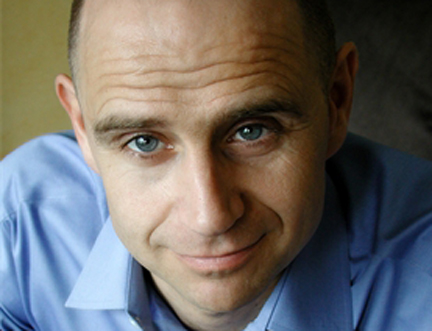More articles Thursday 24 August 2017 9:40pm
Evan Davis on Truth and Post-Truth at the Book Festival

BBC Newsnight presenter Evan Davis says he feels “frustrated” that short television interviews do not give him enough time “to properly get into things”, while he believes there is a “danger” that an adversarial approach to interviewing can lead to “a more defensive posture” from interviewees.
“I don’t think it makes sense for there to be one language of interview which is entirely from the premise that the other person is a crook and you’re trying to catch them out,” he told a sell-out event at the Book Festival. “I think it is possible sometimes to just ask questions and get answers, and in my view, you want a mixed ecosystem of interviews.
“I think there is a danger that an adversarial approach to interviewing leads to a more defensive posture by interviewees...I think it was great what [Jeremy] Paxman did and it’s great what [John] Humphreys does, [but] whether you want every interview to be conducted that way I think is not the case.”
And on interview lengths, Davis said he encouraged his colleagues to have “fewer discussions” on Newsnight, “because I often think if I had just one side of the argument in the room in front of me I can actually interrogate their argument, but as soon as you’ve got two or, God help us, three participants, by the time everybody’s had a turn just to spell out their basic point, there’s no time left to interrogate. A typical discussion is five minutes, it’s barely enough to get anywhere…I feel frustrated because we don’t have time to properly get into things.”
Davis was in discussion about his new book, Post-Truth: Why We Have Reached Peak Bullshit and What We Can Do About It, which looks at the “panoply of deception employed in all walks of life” in the era of Brexit and Trump. He talked of how a “very divided time” had caused people to “entrench around positions and to believe things that suit their position rather than believe things that are true…and these divided tribal situations have a habit of getting more and more fraught.”
Commenting on the recent UK general election, Davis said the campaign showed that what he called “that old bullshit, that sort of professional PR-controlled messaging bullshit had…become devoid of any influence or power”, meaning “this new kind of Donald Trump-style bullshit, fresh-faced bullshit…suddenly had a fresher appeal”. The reason, therefore, Theresa May was seen to have performed poorly was because she could not do “the new-style bullshit…the old-style bullshit was on display and it didn’t work for her, it didn’t work for her at all.”
And asked by a member of the audience about “truth” during the Scottish independence referendum, Davis said he believed the Remain campaign in last year’s European referendum had “wrongly” assumed that another “Project Fear” campaign would also help keep the UK part of the EU. “Actually, they hadn’t won the Scottish independence campaign, they [had] won the referendum,” he said, “and the spurious precision that was applied in the Brexit referendum I think lost voters rather than gained them.”
Nevertheless, Davis said he remained an optimist. “Bullshit is a short-term phenomenon,” he said. “When it works, it works, until the truth becomes so compelling that it stops working. Mostly the truth will out, mostly we will observe the truth, so I think essentially I’m optimistic the truth prevails in the end, and I’m optimistic that you [the public] are bright enough to see bullshit for what it is most of the time.”
- 2025 Festival:
- 9-24 August
Latest News
 Communities Programme participants celebrate success of 2024
Communities Programme participants celebrate success of 2024



